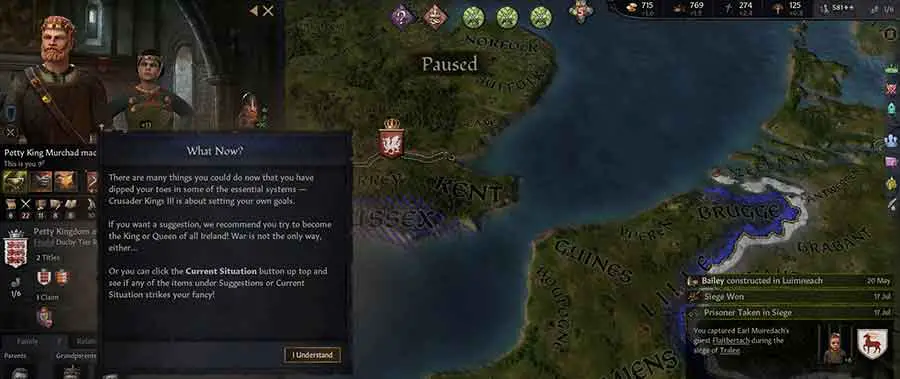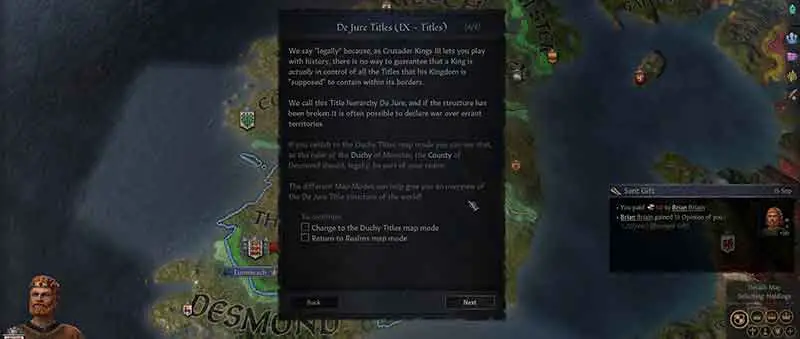
True to the graphic, “What Now?” is the first thing you’ll think when you start CK3 for the first time. At the very start you’ll need to pick a spouse, choose a lifestyle, nominate your successor, instigate schemes like swaying your Bishop so he will have a higher opinion of you, and maybe even declare a war. But after all this and you unpause the game, what now?
Crusader Kings 3 is certainly worth the time and money you will invest in it trying to decide on the “What Nows.” This game is deep in both lore and strategy and you’ll get immense satisfaction from murdering that pesky, insolent Ruler next door to you. It’s a game with seemingly endless possibilities as you try to ensure your dynasty’s survival.
I’ve tried a few Paradox grand strategy games in the past and all of them but Stellaris overwhelmed me. Crusader Kings 3 is the first Paradox game set in Medieval times that I’ve made a serious attempt to learn. Although it’s deep I feel as though I’ve learned the concepts well enough to play the game without too much frustration and a lot of enjoyment.
When I compare this to other grand strategy games I’ve played, like Stellaris or Galactic Civilizations 3, I must confess I understood those game concepts a little better and I enjoyed them a little more too. I would chalk that up to being a space game fanatic and nothing more. When I compare this game to other similar medieval games, like the Total War series (not sure if that is actually a fair comparison but I never played CK2) I find that it stacks up well against them. I found this game to be better due to its depth of strategy plus it lacks the frustration of attempting to move units at the right time and face them in the right direction, like you need to do in the Total War series. I found the actual combat in the Warhammer series to be much better then in CK3, but after all, I am a warmonger.
This is a game about people and families, not one about war and conquest. The game strives to make the people and dynasties in it real and it does a very good job at that. If you’re looking for a war and conquest game you’ll need to look elsewhere.
Read More: Need to arrange a marriage? Want to know what this game is all about?
How Long Is The CK3 Tutorial?
The CK3 tutorial will take about an hour to complete. It will walk you through the game basics, like using the camera and pausing the game, rules of the land (maps), characters, resources like gold and prestige, finding a spouse, titles and the de jure system.
Games today seem to be doing a lot better job on their tutorials and CK3 is no exception. The tutorial is well-written and relatively bug free. It does an excellent job walking you through the game basics but it does throw a vast amount of information at you. It would be a good idea to take notes on paper or record some of it as you progress through it, especially if you’re new to this type of game. The first time going through the tutorial should take you around an hour.
The tutorial will start you out as Petty King Murchand in the year 1066 AD. The tutorial tells you right up front there is no way to “win” the game, the enjoyment comes from playing different characters in different ways. The tutorial has nine parts and it will start you out with typical stuff, like camera movement, pausing and unpausing the game plus some basic definitions, like the paper map and political map.
As the tutorial progresses it provides dozens of definitions via its tooltip system. It’s a simple matter to hover over text highlighted in blue and get a definition for it. It delves into things like character traits and skills and how to interact with other characters in the game.
The tutorial covers much more, such as resources, managing your Council members, Buildings, and De Jure titles. It covers all the basics in the game and “ends” by having you declare war. I put the “ends” in quotes because that’s when you finally unpause the game and learn to raise armies, the tutorial still pops up a lot of help as the game progresses.
The Hardest Part Of CK3

The hardest part of the game is getting a grasp on the de jure system, titles, and the units of land, plus their hierarchy. Since I’ve never played CK3 or a game similar to it before these concepts were totally foreign to me. For example, to me a Title is something a character would have when actually it’s a land title. Fortunately, two sections of the tutorial were dedicated to those subjects. Going back and reviewing those sections has helped.
Like all games of this type I like the deep strategies involved. This game has many systems that interact, like opinion, traits, skills and lifestyles to keep it interesting. With so many systems in play, so many characters to choose from and even various years to start the game in, it means that no two games will ever be exactly the same.
For me this game had a steep learning curve. After 35 hours of play time (I know this doesn’t qualify me as an expert) I still don’t have a solid grasp of the game, but I learn a little more each time I play the game. As I mentioned previously, the de jure system and titles eluded me at first, and I still have trouble keeping them straight.
Read More: You can reduce the learning curve at this page on my website.
The early game will keep you interested right from the very start since you will be making decisions that will affect you for the length of the game. There is not a lot of mystery or intrigue up front, that’s something you’ll discover as the game goes on, but making decisions and formulating your early strategy will hold your interest.
Once you start a new game one of the first things you may have to do is nominate your successor. Of course, anyone you nominate should be in your Dynasty. You’ll need to decide what lifestyle you want your character to lead, Diplomacy, Martial, Stewardship, Intrigue, or Learning, and you’ll need to get married. Once that’s done you will need to check on your council members and perhaps make a change or two. After that you can start formulating your overall strategy for the game. Conquest? Build up your economy first? Assassinate people? Each game and situation is different, so what’s worked well in the past may not be such a good thing this time around.
CK3 Resources
As a fledgling empire you’ll need resources to both expand and defend. In CK3 there are four types of resources but Gold is what makes the world go round. One easy way to gain Gold is to increase taxes at the expense of unhappy Vassals and Peasants. Another method is to construct building that will add to your economic base so you can conquer nearby counties, resulting in more people to tax and buildings to collect Gold from. Prestige, Piety, and Renown are the other three resources that you’ll need, and each is collected in a different way and has different uses.
This game has a lot of depth and variety to it that makes it fun and interesting. Random events pop up from time-to-time forcing you to make decisions that will affect you for many years to come. The variety comes from having so many characters, religions, and more than one time setting to play in, plus you can design your own Ruler if you want to. There is also an element of uncertainty that draws you into the game, you never know when you’re going to be asked to join a war by an ally, if someone is planning a sneak attack on you or if your “friend” is actually trying to murder you.
War In CK3
For me the one of the interesting parts of the game is how the wars work. Armies typically don’t battle each other one-on-one unless one of them thinks it has a good chance of winning. Your armies will instead march off to the Holding they are directed to take and start sieging it. The enemy will do likewise. If your garrison forces can hold out long enough for you to take your objective, you can rescue your Holding that is under siege, and if you catch the enemy off-guard, you can fight his army and chalk up a victory (hopefully). This is not like the types of wars I’m used to waging but it’s still a lot of fun.
Regardless of how peaceful you are you will eventually be forced into a war either defensively or offensively. To declare war you need a Casus Belli, which is viewed by other leaders as a legitimate reason to go to war. The Casus Belli will define the objectives, and if you win, that’s the only thing you gain and nothing more. This prevents even the most decisive defeats from knocking a character completely out of the game, typically all he or she will lose is some territory and prestige.
Read More: Casus Belli is a legitimate reason to declare war. Visit the Casus Belli page at this website for the details.
You can track the war’s progress through the warscore which is a number that is between -100 and +100, the higher the positive number the better for you. When you achieve +100 warscore you can force the opposing side to surrender. You mainly gain warscore by defeating opposing armies or by occupying the enemy’s Realm Capital or other Holdings. You can also increase your warscore by capturing and imprisoning the enemy Ruler or his heirs.
The game makes it easy to see your warscore, just click on the warscore icon and a pop up appears showing you the progress of the war.
The CK3 Council
One aspect I really like about this game is the Council. You have six Council members; an Archbishop (if you’re Catholic), a Chancellor, Steward, Marshal, Spymaster, and of course your lovely Queen (if you’re married). Each member’s proficiency is determined by his or her skill level in that particular job. For example, you want a Marshal with high Martial skills.
All members, except the Queen, have one of three tasks they can be assigned. The Spymaster is probably the neatest one, he can disrupt schemes that someone may be plotting against you, can be assigned to support any devious schemes you may have underway, like a murder scheme, or he can go look for those dirty little secrets no one wants you to find out about so you can gain a hook on that character.
Your Queen is very versatile. She can be assigned to the Assist Ruler, Court Politics, Chivalry, Manage Domain, Court Intrigue, or Patronage task. The Assist Ruler task will give you moderate support in Diplomacy, Martial, Stewardship, Intrigue, and Learning areas. Assigning her a specific task, like Court Politics, would give you a much better boost in Diplomacy at the expense of not getting any help from her in the other areas. There’s nothing better than a loyal, talented wife!
Another portion of the game I like a lot is the character screen. By clicking on your character’s portrait you can go to his character screen and get all kinds of neat information about him and your empire. The information is pretty well laid out on the left side of the screen. With a quick glance you can see what his traits, skills, and vices are. You also get a breakdown of his or her wealth, army manpower, and if any factions are active against you. This screen also identifies your “player heir,” which is the character you’ll play once your current character dies.
Game Set Up
Unlike most other grand strategy games there are no victory conditions to set or random maps to generate, but there are options for creating a Ruler and game rules that can be modified.
There are other options to tinker with if you are so inclined but they have minimal effect on gameplay. Graphics can be adjusted for either full screen or a windowed display and GUI scaling can be adjusted along with all the other standard options for graphics. The same can be said for the audio settings, everything you would typically expect from a game of this caliber.
Even the Game settings have no real effect on the actual gameplay although you do have options for turning off nudity and graphic disease and injuries, which is a nice feature.
The only basic choices you need to make when starting a game is the starting year, scenario and the character you want to play. Choosing a character is also how you set the default difficulty level for the scenario, each character has a rating of whether the game will be played at easy, medium, or hard difficulty.
When you click on a character portrait you’ll get a few more details at the right of the screen. You’ll find out what form of government the character has, the age, culture, faith, difficulty level plus a little background lore. If you click start the game launches into that scenario.
Creating Your Own Ruler
You can create your own Ruler by clicking on the icon in the bottom left corner at the character and scenario selection screen. Clicking it will take you to a screen where you need to select a character first before you can modify him, so you can’t create an entirely new character from scratch but there are a ton of changes that can be made.
To select the character you want to modify you need to click a territory on the map first, the tooltip will tell you who you are selecting as you hover the mouse cursor over the map. Once you select the character the Create your own Ruler icon will become active, and clicking it brings up the Ruler Designer. At this screen you can do things like selecting the sex, culture, change the name, or change the weight and age. You can also modify traits and skills plus determine how many sons and daughter the character will start with and decide whether the character should be married or not.
Modifying The Rules And Difficulty Level
At the Scenario selection screen you can also set the difficulty level by using the slider at the bottom center of the screen.
You can modify the game rules by clicking on the Game Rules button. You can also set the difficulty level here. If you set the Difficulty level to Very Easy you get “significant bonuses” like making it much easier to handle factions. The game defaults to Normal meaning you get no significant bonuses. You can also tweak things like how frequently diseases occur, how often regional heresies occur and toggle Mongol invasions on or off. In all there are twenty-two rules that can be modified. When modifying rules the game will tell you what the effects will be for each modification.
Innovations (Research)
Don’t forget to visit my YouTube channel at https://www.youtube.com/channel/UCcWU6qxVisK93h5guKRVtdg
One item worth touching on is Innovations, which is actually research in CK3. There is no separate icon for Innovations at the main screen, you need to click on the Culture icon (the little candle at the bottom left part of the screen) to get to them. Clicking that will bring up the Culture screen for your civilization. Here you can see what Era you’re in, how far you’ve progressed in it and how many innovations you’ve achieved, and what the next Era is. You can increase the progress of an Innovation by making it your Ruler’s Fascination. You can also view your progress for each innovation. Pretty interesting variation to the traditional research screen.
